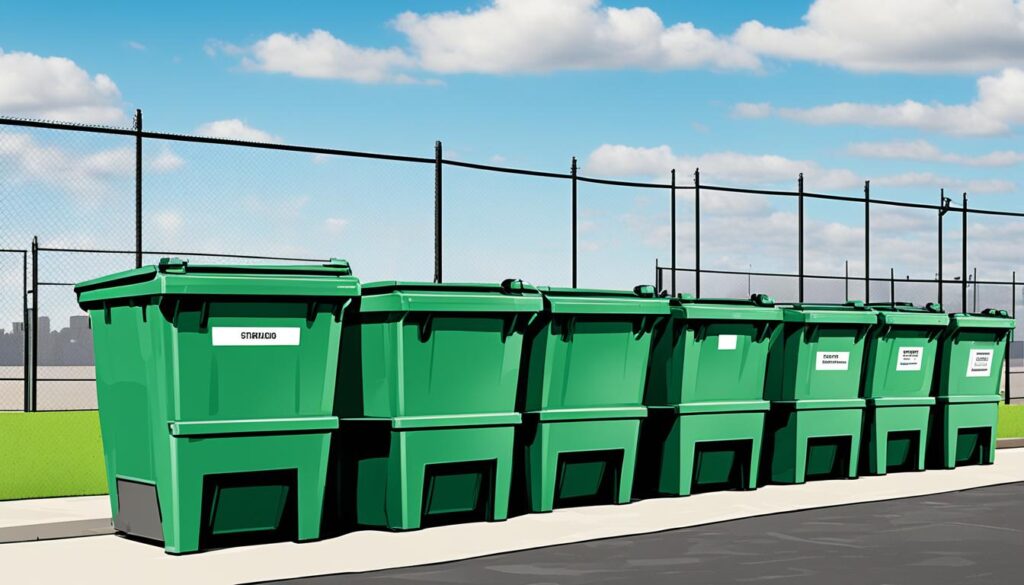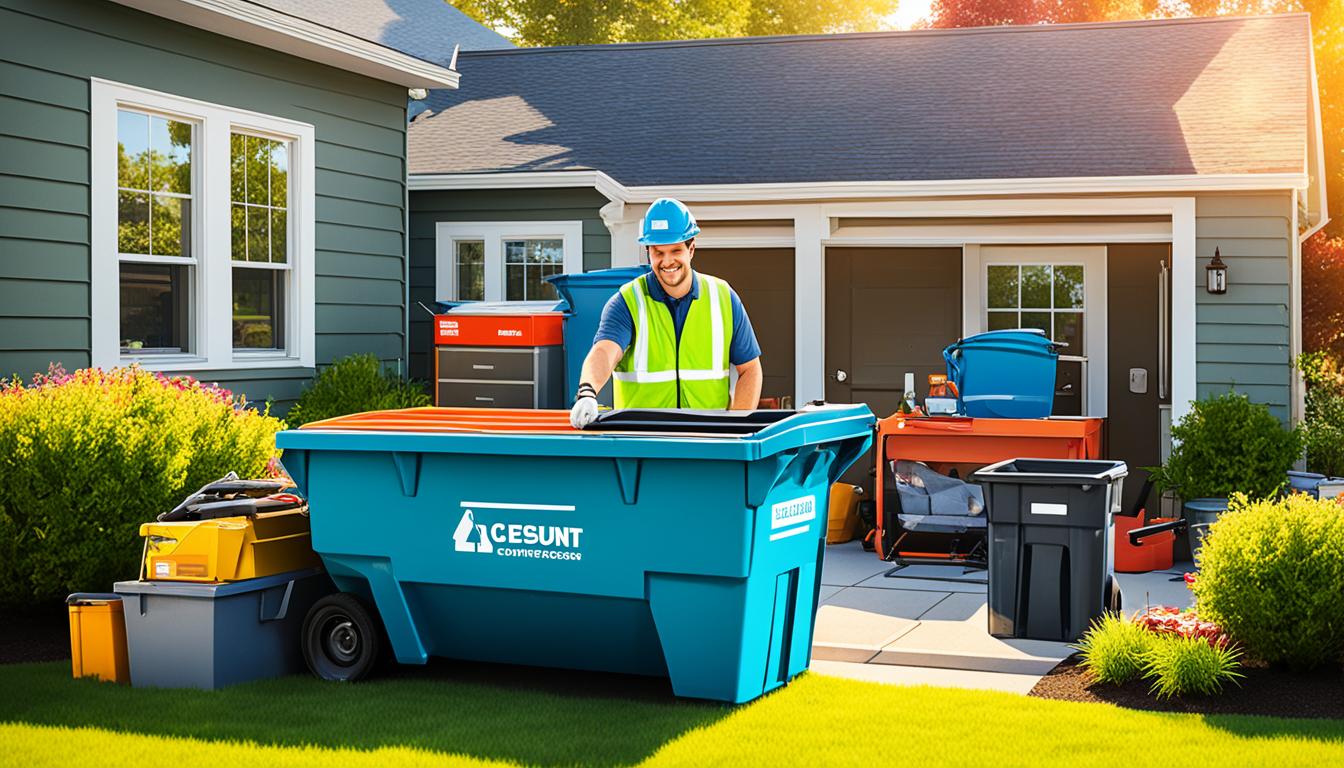Did you know that the global waste management industry, including dumpster rentals, is expected to soar past the 2 trillion dollar mark by 2027? In the United States alone, the increased frequency of construction projects and home renovations have created a burgeoning demand for efficient waste disposal solutions. If you’re considering how to start a dumpster business, there couldn’t be a more opportune time. With society’s heightened focus on sustainability, starting a waste management company positions you at the forefront of a critical and profitable sector. This dumpster rental business guide is your gateway to turning trash into treasure in the waste management industry.
Key Takeaways
- The waste management industry’s rapid growth signals a prime opportunity for dumpster rental startups.
- An increase in construction and renovation projects drives the need for dumpster services.
- Environmental responsibility is a significant influence in the dumpster rental market.
- A well-planned dumpster rental business can be both profitable and essential to modern waste management strategies.
- Leveraging the increasing market demand is key when embarking on starting a waste management company.
- Aspiring entrepreneurs must recognize the scope for innovation within the industry.
Understanding the Dumpster Rental Market Landscape
As you delve into launching a garbage collection business, it’s imperative to grasp the full scope of the dumpster rental market. A sharp increase in development projects and a heightened awareness of environmental impact have set the stage for new entrants to thrive in this sector. Prepare to set your waste management business plan against a backdrop of changing needs and evolving technologies that are shaping the industry’s future.
The Surge in Waste Management Needs
The current construction upswing and the rise in home remodeling have led to an elevated demand for efficient waste disposal services. This is your opportunity to tap into this expanding market by offering dumpster rental services that cater to the needs of both residential and commercial clients. Your business can become an indispensable asset in managing the uptick in waste generation.
Impact of Environmental Consciousness on the Industry
Environmental stewardship is now more than just a buzzword; it’s a business imperative. Customers are actively seeking out dumpster rental providers that align with their values by offering sustainable practices like recycling initiatives or composting options. By integrating eco-friendly solutions into your business model, you’ll appeal to a growing demographic that prioritizes green practices.
Technological Advancements in Dumpster Services
- Innovative waste tracking systems
- Efficient collection methods
- Customer service enhancements through technology
Staying ahead of the curve with advanced technologies is crucial for maintaining a competitive edge. Invest in systems that not only improve operational efficiency but also provide a seamless customer experience. As technology evolves, so does the potential for your business to offer cutting-edge dumpster rental services that set you apart from the competition.
Grab these dumpster rental industry tips to heart as you navigate the rich terrain of the waste management industry. With a solid waste management business plan that considers these factors, you’re paving the way for a successful and sustainable entry into the dumpster rental market.
Navigating Initial Investments and Startup Costs
When you’re ready to take the plunge into the waste management industry with a dumpster rental business or a junk removal company, understanding the initial investments and startup costs is key to ensuring a solid financial foundation. These costs are your first significant steps to launch a dumpster rental business, and encompass a wide range of expenses. Let’s walk through some of the initial financial outlays you’ll encounter on your journey.
- Purchasing Equipment: Your essential equipment includes dumpsters and a reliable roll-off truck to transport them. Given the nature of the work, quality and durability should be priorities.
- Securing Premises: You’ll need a warehouse or a storage lot for your dumpsters. This should be strategically located for ease of access and operations efficiency.
- Insurance, Licenses, and Permits: You can’t skimp on these; they’re non-negotiable and form part of your legal requirements to operate.
- Brand Development and Marketing: Building a strong brand and informing potential customers about your services through website development and social media marketing are important initial investments that can pay off in customer growth.
- Networking: Attending industry networking events puts you in touch with potential clients and partners, and while it might not have immediate tangible returns, it’s a vital investment for long-term gains.
Starting a junk removal company or dumpster rental service is not without its challenges, but with careful planning, the initial costs will lay the foundation for a sustainable and profitable business in an industry where demand is ever-present. Remember, these costs are just the beginning; your dedication and entrepreneurial spirit will drive your business forward.
How to Start a Dumpster Business: Your Step-by-Step Guide

Starting a waste management company requires comprehensive planning and strategic execution. Here are targeted tips to ensure your dumpster service stands out and operates successfully.
- Conduct Market Research: Identify local demand, competition, and potential pricing strategies. Understand the unique needs of your target market.
- Find Your Niche: Specialize in a particular type of waste management to differentiate your services from competitors.
- Calculate Operating Expenses: Factor in costs such as equipment maintenance, fuel, employee salaries, and insurance premiums.
- Explore Safety and Compliance: Invest in employee training, equipment that meets safety standards, and ensure your business adheres to all regulations.
- Estimate Start-Up Capital: Determine the initial investment needed for purchasing trucks, dumpsters, and other necessary equipment.
- Develop a Marketing Plan: Create a strategy to build brand awareness, focusing on digital marketing, local advertising, or partnerships.
As you embark on setting up your dumpster service, always prioritize sustainability and efficiency to appeal to environmentally conscious consumers. Establishing a robust network of business relationships and securing your service against non-payment will lay a foundation for a prosperous enterprise in the waste management industry.
- Network with other business owners and vendors within your industry to build crucial partnerships.
- Implement safeguards, like clear contracts and reliable invoicing systems, to protect your dumpster business financially.
By following these steps, you’ll position your new venture for long-term growth in the essential domain of waste management.
Identifying Profit Margins in the Dumpster Rental Industry
As you delve into the dumpster rental business, understanding the delicate balance between expenses and income is vital for your profitability. The success of your venture rests on how well you align your pricing strategies with the demand for waste management services. Let’s dive into how you can carve out a substantial profit margin in this evolving industry.
Understanding Pricing Strategies for Rental Services
Setting the right prices is more than just a numbers game; it’s about understanding the value you provide. Here’s how you can approach pricing:
- Research local market rates to stay competitive
- Factor in the size and type of dumpsters you offer
- Adjust prices based on rental duration and frequency of service
Assessing Operational Expenses Against Projected Income
To ensure the profitability of your dumpster rental business, it’s crucial to have a firm grip on your finances. Operational expenses can eat into your margins if not kept in check:
- Calculate your costs, including vehicle maintenance, fuel, employee wages, and dumpster upkeep.
- Project your income based on rental rates and service contracts.
- Benchmark your business against industry standards for a healthy profit margin.
By intricately understanding these economic dynamics, you can position your dumpster rental business as a profitable fixture in the landscape of waste management services.
Building a Solid Waste Management Business Plan
As you embark on the exciting journey of starting a junk removal company, it’s imperative to construct a comprehensive business plan that lays the groundwork for your success. A well-developed plan not only guides your strategic decisions but also attracts investors, and provides a blueprint for growth when launching your garbage collection business.
Key Components of a Successful Business Plan
Every robust business plan should encompass a few essential elements that highlight the feasibility and potential of your enterprise:
- Executive Summary: An engaging overview that encapsulates your vision.
- Market Analysis: In-depth research on industry trends and target demographics.
- Company Description: A compelling narrative on your brand’s role in the market.
- Organizational Structure: Illustrate the management hierarchy and operations model.
- Service Offerings: A detailed account of your services, from dumpster rentals to recycling.
- Marketing Strategies: Outreach approaches to connect with your audience effectively.
- Financial Projections: Income, expenses, and profitability forecasts to ensure economic viability.
Adapting Your Plan for Long-Term Scalability
Your initial business plan is just the beginning. As your operation evolves, adapt and refine your strategy to foster the longevity and scalability of your junk removal enterprise:
- Assess Periodic Performance: Regularly review your business’s performance against the plan.
- Identify New Opportunities: Stay alert to emerging market needs and technological advancements.
- Incorporate Feedback: Utilize customer and employee feedback to make informed adjustments.
- Plan for Expansion: Forecast additional services, new markets, and extended geographic outreach.
By preparing for future growth and remaining flexible, your waste management company will be well-positioned to adapt to market changes, ensuring your brand continues to thrive in the dynamic landscape of waste management.
Scouting the Ideal Location and Understanding Zoning Laws
When starting a dumpster business, finding the right location is key to the success of your operations. Your strategic positioning determines how efficiently you can serve clients and manage logistics. It’s essential to choose an area that is not only accessible for roll-off trucks but also convenient for customers in need of waste management solutions.

As you dive into the steps to launch a dumpster rental business, you’ll quickly realize that compliance with local zoning laws cannot be overlooked. These regulations dictate where you can place your dumpsters, both for active rental purposes and for storage when they’re not in use. Moreover, they govern the types of waste materials you can handle and the processing activities you can perform.
- Research Local Zoning Regulations: Understanding local laws will prevent costly legal oversights and ensure your business operates within the bounds of legality.
- Identify Your Target Market: Location scouting is more than just finding a legal spot—it’s about being where your services are most needed, such as near construction zones or residential areas undergoing renovations.
- Consider Accessibility: Your selected location should allow trucks to easily pick up and drop off dumpsters, ensuring quick and efficient service delivery.
Keep in mind that the waste management industry is subject to stringent regulations for a reason. The impact on the environment and public health is significant, so adherence to these laws is not just about avoiding fines—it’s also about contributing to the sustainability of your community.
If you’re dedicated to the vision of running a successful dumpster rental company, investing time in thorough research and compliance is non-negotiable. Your efforts will pave the way for a smooth operation and contribute to building a reputable and dependable brand in the waste management sector.
Garnering the Necessary Permits and Navigating Regulations
Embarking on your journey to start a dumpster business means wrapping your arms around a bouquet of legal and environmental regulations. While the nuts and bolts of your operation are crucial, the real backbone of your company lies in being in step with all necessary regulatory compliances. When you dive into the dumpster rental business guide, one unmissable section will be how intricately the law intertwines with waste management.
Before you rev up your roll-off trucks and send out your shiny dumpsters, securing the appropriate permits will be your early mission. Whether you’re a novice entrepreneur or a seasoned waste management expert looking to pivot into rentals, understanding the specific permits needed in your municipality is a task that requires patience and precision.
Staying Compliant with Environmental Standards
Your dumpster rental service can have a lasting impact on the environment. Hence, it’s imperative to align your operations with the prevailing environmental standards. Remember, each state may have distinct requirements concerning waste handling and disposal. Ensuring your business operations fall within the boundaries of these regulations is not just about avoiding fines—it’s about upholding a commitment to the planet and fortifying your reputation.
Securing Permits and Building Industry Relationships
Cultivating relationships with the local government and key industry figures can significantly smooth out the permit acquisition process. These alliances will arm you with insights and support that go beyond the paperwork. They become indispensable as you navigate the ebbs and flows of the regulatory terrain. With each permit secured, you don’t just get a stamp of approval but embark on a journey to establish your business as a credible and trusted entity in the marketplace.
- Research your local and state’s specific permit requirements for waste management services.
- Maintain vigilant compliance with environmental laws to ensure the safety of your community and the ecosystem.
- Forge solid relationships with local government entities, environmental agencies, and other waste management professionals.
- Familiarize yourself with the waste disposal sites in your region and their respective policies.
By stringently following these steps, your guide to starting a dumpster business becomes a manifesto of responsible entrepreneurship. As you lay the foundations for your dumpster rental business, remember that these early stages of compliance will dictate the sustainability and prosperity of your venture in the bustling waste management industry.
Investing in the Right Equipment for Your Dumpster Business
When you’re taking the necessary steps to launch a dumpster rental business, selecting the best equipment is not just about buying trucks and containers — it’s about investing in the future of your company. You’ll have to balance cost with quality, keeping in mind the long-term durability and maintenance of the equipment you choose. Here are some practical tips for setting up a dumpster service that is equipped for success.
- Analyze Your Budget: Decide how much you can afford to invest without putting your new business at financial risk.
- Quality vs. Cost: Consider purchasing used equipment for initial cost savings, but inspect thoroughly to ensure longevity.
- Right-Sizing Your Fleet: Start with a manageable fleet size that can handle your projected client load and scale as you grow.
- Maintenance Plans: Factor in the service requirements for your roll-off trucks and dumpsters to minimize downtime.
Remember, the choices you make today will affect your daily operations, client satisfaction, and ultimately, your bottom line. Invest wisely, and you’ll be set to take the industry by storm.
- Opt for Durable Materials: Select dumpsters made from high-grade materials to withstand the demands of heavy waste materials.
- Keeping Technology in Mind: Look for equipment with the latest technology for efficiency, such as GPS for tracking your fleet.
- Environmental Compliance: Ensure your equipment adheres to environmental regulations to avoid potential fines or business shutdowns.
- Brand Presentation: Your trucks and dumpsters are mobile billboards. Consider branding them for increased visibility and marketing appeal.
By following these steps, your dumpster rental service will be well-equipped to handle the challenges of the industry, paving the way for a successful and thriving business.
Implementing Effective Marketing Strategies to Capture Market Share
For your dumpster rental business to truly stand out in a competitive market, leveraging the power of strategic marketing is indispensable. A multifaceted approach that combines digital savvy with robust customer engagement can help skyrocket your brand visibility and attract a loyal customer base.
Digital Marketing Essentials for Reaching Your Audience
Starting with the digital landscape, ensure your online presence is both compelling and widespread. Establish a user-friendly website optimized for search engines to help potential customers find your dumpster rental services with ease. Prioritize local SEO strategies to appear in search results when customers are in dire need of rental options in their vicinity. Make sure your website is informative and seamlessly guides users from learning about your services to taking action.
Use Google My Business to its full potential by claiming your listing and providing up-to-date information. This platform gives you visibility in local searches and maps, making it easier for customers to locate your business and utilize your services. It’s also an excellent avenue for gathering customer reviews, which leads us to the undeniable value of social proof.
Leveraging Social Proof and Building a Strong Brand Presence
In the dumpster rental industry, trust is a key commodity. Accumulate positive customer reviews by providing exceptional service and encouraging satisfied clients to share their experiences online. Feature these testimonials prominently on your website and social media to highlight your reliability and quality of service.
Boost your brand’s growth and visibility further by adopting a strong branding strategy. This includes using professional logos and branded decals on your equipment as mobile advertisements. Social media platforms offer additional avenues to connect with your audience, showcase your brand identity, and share valuable content that establishes your expertise in the dumpster rental industry.
- Engage with your community through posts and responses to feedback, demonstrating your commitment to customer satisfaction.
- Create content that positions your business as a solution to common problems, such as managing construction waste or executing large-scale cleanouts.
- Utilize targeted advertising to reach niche markets and drive more qualified leads to your business.
Incorporating these dumpster rental industry tips into your marketing strategy will not only help you connect with your audience but also position you as a leader in the marketplace.
Crafting Customer Service Policies to Enhance Client Satisfaction
When you’re embarking on starting a junk removal company, remember that the cornerstone of your success will be how well you handle establishing customer relationships. In the bustling dumpster rental market, your customers are your most valuable assets, and your approach to service can set you apart from competitors. To ensure you’re consistently providing exceptional customer experiences, it’s critical to have customer service policies that are as solid as the dumpsters you rent out.
Here’s what you should focus on:
- Clarity is Key: Craft service agreements that are straightforward and easy to understand. Eliminate jargon to avoid any confusion that could harm the customer relationship.
- Fairness Front and Center: Ensure that your policies are not just comprehensive but also fair. Customers should feel that they’re getting the value they expect and deserve.
- Responsiveness: Time is of the essence in your line of work. Make a commitment to address service calls and inquiries promptly. A quick resolution can turn a potential issue into a display of your reliability.
- Feedback Loop: Encourage and seriously consider customer feedback. This will demonstrate that you value their opinion and are committed to continual improvement.
- Personal Touch: Even in the digital age, a personal approach goes a long way. Train your team to provide a friendly and empathetic service experience.
Place special emphasis on how you deal with service failures. Even the best-run companies encounter problems, but it’s your response that customers will remember. Take accountability and move quickly to make things right. A proactive rectification process not only mitigates damage but can even strengthen customer trust.
Remember, positive experiences are shared experiences. They lead to referrals, reviews, and repeat business—all valuable currency for your burgeoning venture. So, invest time in training your staff, developing a robust service policy, and always, always keep the customer’s needs at the heart of your operations.
Your commitment to customer service excellence will be a defining factor in your success. To build on this, make yourself accessible, maintain open lines of communication, and become the junk removal service that customers look to with confidence. With these principles, you’re not just starting a junk removal company—you’re building a brand that stands for reliability, integrity, and customer care.
Analyzing and Overcoming the Challenges in Dumpster Rentals
Launching a garbage collection business requires grit and an entrepreneurial spirit. As you enter this industry, you’ll swiftly encounter a range of challenges unique to the waste management sector. One of the more pressing issues is the high cost associated with waste disposal. To keep your business financially healthy, you’ll need to be strategic about negotiating disposal fees at local landfills and finding ways to minimize waste handling expenses without compromising environmental responsibilities.
Another significant hurdle is adherence to the stringent environmental regulations that govern the industry. It’s imperative for the sustainability and legality of your enterprise to stay abreast of the latest legislations. Compliance can often mean investing in better equipment and embracing eco-friendly practices, which may initially seem like a costly endeavor. However, such investment not only aligns with regulatory standards but can also enhance operational efficiency and improve your company’s public perception.
Lastly, in the face of competition from well-established companies, it’s crucial to carve out a niche for your dumpster rental business—if you aim to stand out. Foster exceptional customer service and strong community relationships. Realize that in this line of work, your reputation for dependability and service quality can make a monumental difference. Keep in mind that challenges in the dumpster rental business are not just obstacles; they’re opportunities to innovate and differentiate your brand in a crowded marketplace.




